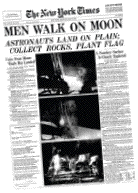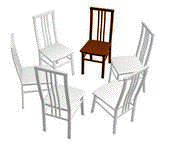
 Join your community on the Internet
Join your community on the Internet 
 Twenty years ago a news org had a community, and tools for communicating with it. That pretty much defined what a newspaper was. It still does, but the inputs and outputs work differently than they did in the past. And news orgs are just slowly catching up.
Twenty years ago a news org had a community, and tools for communicating with it. That pretty much defined what a newspaper was. It still does, but the inputs and outputs work differently than they did in the past. And news orgs are just slowly catching up.
Rather than explain how it worked in the past, something everyone is familiar with, let's try to understand how it works today.
1. The audience is on the Internet. Obviously true for written publications, and about to become equally true for video news. Audio is different because of cars, where broadcast still has a big role, but that will decline over time.
2. Sources are also on the Internet. Everyone's sources. Reporters, find your quotes on the net and link to them. Stop asking for phone interviews. Everyone else: write a blog post and say what you really think. Don't dumb it down.
3. News is an environment, not a publication. The front pages of news sites are irrelevant. I can't remember the last time I went to the home page of any site when I wasn't just looking for the address of a feed.
3a. So how do you find the news stories. A myriad of ways. All of which can be outside of corporate blogging silos, and very soon everyone will see why this is so important. It's not like there will be a big revelation, but gradually the corporate sites will restrict their use such that the things we want to use them for will not be possible. Facebook is already doing this by having a clear policy that people must use their real names. They've always had this policy so it's nothing new, and it's not wrong. What would be wrong would be to ignore it, and assume Facebook is useful for everything the Internet is useful for.
 3b. And where do you park your electronic Internet keister? Aha! That's a problem y'all forgot to solve. You're using Twitter and Facebook. But really that's not going to work long-term. We need to all put our heads together and figure this one out. How will news work on the Internet next year and the year after. That's your job Mr and Ms Journalist and Editor and J-school professor, to figure that out. The kids in Silicon Valley don't have the first clue, so stop looking to them.
3b. And where do you park your electronic Internet keister? Aha! That's a problem y'all forgot to solve. You're using Twitter and Facebook. But really that's not going to work long-term. We need to all put our heads together and figure this one out. How will news work on the Internet next year and the year after. That's your job Mr and Ms Journalist and Editor and J-school professor, to figure that out. The kids in Silicon Valley don't have the first clue, so stop looking to them.
4. Reporters and editors have to worry about bridges in places you didn't have to before. It used to be you had to be careful with a handful of egos, because you needed them as sources (organizations leak at the top) and because you had to put them on the cover once a year. Now you have to be careful not to take shots at someone you might need as a source next week and you never know who that might be (did you know that Egypt would turn out to be a hot story). That's how journalism was supposed to work, btw, imho. You shouldn't be out there burning bridges, breaking deals, talking stupid trash about people doing important work. Again, no one cares about Julian Assange's socks. That is so wrong. Don't burn the bridges, or at least don't burn them just for the fun of it.
5. Please pay attention to your readers/viewers/listeners' interests. That's one very important reason you use Twitter, not just to broadcast your stories, but also to be influenced by what others say and do. This may be the biggest change in journalism in the age of the Internet.
 6. I said in our podcast yesterday that press organizations should draw their communities closer to them, but that doesn't go far enough. You must join your community. It's already on the net. Stop feeling like you're on top of us and we're "down there." That is no longer what's going on. We're all around you. One day we might be readers, the next day we're your source, but -- get this -- we're still the same person every damned day no matter what we look like to you. There's a role for you to play. While WikiLeaks shuffled the deck it did prove that we need professional journalists, but it's different today from what it was in the past. Big deal. That's good! We have a chance to make the world work better. Finally.
6. I said in our podcast yesterday that press organizations should draw their communities closer to them, but that doesn't go far enough. You must join your community. It's already on the net. Stop feeling like you're on top of us and we're "down there." That is no longer what's going on. We're all around you. One day we might be readers, the next day we're your source, but -- get this -- we're still the same person every damned day no matter what we look like to you. There's a role for you to play. While WikiLeaks shuffled the deck it did prove that we need professional journalists, but it's different today from what it was in the past. Big deal. That's good! We have a chance to make the world work better. Finally.
That's the bottom line. Tatoo that on your forehead so you see it when you're shaving or putting on your makeup in the morning...
Join your community on the Internet.
Over and out.
 Why I feel good about staying with RSS
Why I feel good about staying with RSS 
 I feel good about staying with RSS.
I feel good about staying with RSS.
It's a good gateway. I realized that this morning when I finished a user-facing feature that builds on TwitterFeed. Why should I worry about how to connect to Twitter. It's become a chore to keep up with their APIs and various conceptual complexities. Let the TwitterFeed guys do that. I can leverage all their work by simply outputting RSS.
If you want a 140-character limit, then don't use more than 140 characters. If you find it ridiculously confining (try to have a "discussion" about any real subject in 140-char chunks and you realize it's hopeless) then write at the length that works for you. If people don't want to read your ramblings, they won't read them. You learn how to make your ideas persuasive, and gauge the interest of the people you're talking to.
I feel comfortable rambling here a bit, because my readers are highly intelligent and are receptive to new ideas. And you guys are accustomed to me rambling. ![]()
It's remarkable how things always come back to the tried-and-true ideas. Does this sound a lot like Dogma 2000 to you? It does to me.
Something else that's really cool about TwitterFeed. I store my stuff where I want to and then tell them where I put it. This is so much more rational that the other approach, where I give my stuff to a website and they decide how I can access it. And of course they can change the rules anytime. See how much better the RSS approach works.
PS: This was inspired by a post on Joe Moon's blog.



